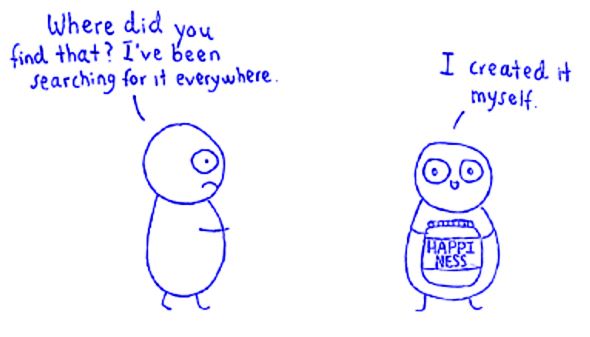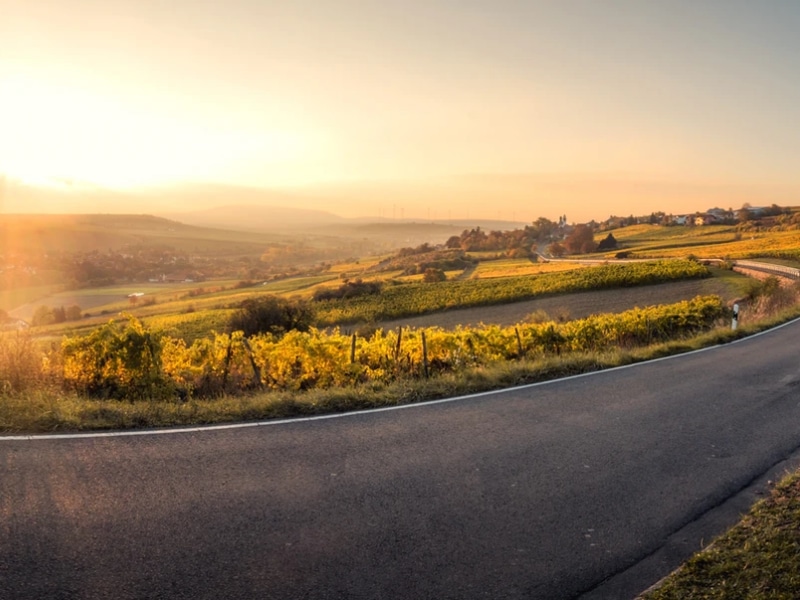“Happiness is a journey.” You’ve definitely heard this before. So what exactly does it mean? If happiness isn’t a destination, then how do we find it? And if happiness is a journey, does that mean we never really get there? Many people swear by this common saying – so are they right, or is it just a cliche?
Your happiness depends on a lot of things, like genetics and life experiences – but as much as 40% is in your control. The way you conceive of happiness can have a big impact on just how happy you are. If you go chasing after it, you may find it slips through your fingers. The expression “Happiness is a journey” is all about thinking about happiness the right way – and finding ways to enjoy all the steps.
There are a couple of different ways to interpret this expression, and each of them will teach you something important about happiness. In this article, we’ll look at all the ways happiness can be thought of as a journey, with examples and actual research to help you apply them to your own life.
Contents
Happiness as a goal in life
We often talk about happiness as a goal — something to be attained, like a pot of gold at the end of the rainbow.
The problem with this approach is that we forget to enjoy the present moment. There’s nothing wrong with setting goals for yourself, but if you think achieving a certain goal will finally bring you happiness, you may be in for a disappointment. One reason is that the predictions we make about how we’ll feel in the future aren’t very accurate.
I’ll be happy when …..
When I was studying psychology at university, one of our professors asked us at the beginning of the course to fill out a survey. Several of the questions had to do with what grade we thought we’d get, and how we’d feel if we got a better or worse grade. At the end of the year, after we received back our grades, we were asked to note our emotional response.
It turns out that almost all our predictions were incorrect. Those of us who got a better grade than we’d predicted at the beginning of the year didn’t feel as happy as we thought we would – and those of us who got a worse grade didn’t feel as bad as predicted!
The ability to accurately predict our future emotional states is called affective forecasting and it turns out that humans are pretty bad at it. We make consistently bad predictions about how we’ll feel:
- When a relationship ends
- When we do well in sports
- When we get a good grade
- When we graduate from college
- When we get a promotion
- Just about anything else
There are a couple of different reasons why we’re so bad at this, but two of the main ones are because we usually overestimate how intensely we’ll feel an emotion and for how long.
Another important reason we’re bad at predicting our emotions is that we usually fail to take into account the complexity of future events. You might think you’ll be happy when you get a promotion – but you may find yourself over-worked, with too much responsibility and not enough time.
Affective forecasting in science
Finally, this study found that the more people equate goal-achievement with happiness, the more they’re likely to be miserable when they fail to achieve that goal. If there’s a lesson to be learned from poor affective forecasting, it’s that you shouldn’t count on specific events to make you happy.
A little happiness every day vs a lot of happiness at once?
Another reason why it’s not great to put all your happiness eggs in one basket is that your happiness depends more on the frequency of happy events, and not the intensity.
In other words, it’s better to have lots of little happy moments than one or two bigs ones. Not only this, but research has shown that happiness from individual events doesn’t actually last that long. And it turns out that one of the best ways to prolong feelings of happiness following an event is to relive what it is that made you happy.
These three studies together tell us something very important about happiness: you should try to maximize the number of small, happy events in your life as much as you can.
Why is happiness a journey and not a destination? Because whatever you think is the destination, it probably won’t make you as happy as you’d like, and you may end up miserable if you don’t get there. It’s better to enjoy little events along the way.
Creating your own happiness
I came across this cute and clever meme today in the gym. Maybe you’ve seen it.

It got me to thinking that one of the reasons why lots of people are unhappy is because they go out looking for happiness, rather than cultivating it in their lives. In a previous article, we explained how happiness is an inside job – it’s something that you can build up from the inside, without having to resort to external sources.
One overview of the paradoxes inherent in seeking happiness came to this conclusion:
Happiness is pursued indirectly as the by-product of meaningful activities and relationships.
While the reasons are manifold (and a bit complex), it looks like “searching for it everywhere” is just about the worst way to go about it. Maddeningly, this study found that valuing happiness as an end goal or destination may “lead people to be less happy just when happiness is within reach.” Finally, when we’re focused on happiness as a destination, we end up feeling like we have less time to enjoy it. So if happiness isn’t a destination we can find and get to, how do we create it?
Well, I already mentioned one article, but the Learn To Be Happy Blog is full of advice based on real-world examples and research on how to cultivate happiness in your day to day life. Some examples include journaling for self-improvement, spreading happiness to others, and (of course!) being physically active. There are lots of ways to create happiness in your life, and studies have shown it’s a lot more effective than looking for it.
Why is happiness a journey and not a destination? Because you may never find the destination, in which case you’ve got a long, long journey ahead of you. So enjoy it! When you get happiness from the journey, you can stop looking for it elsewhere.
Happiness on the horizon
I love facts. Did you know that we share 50% of our DNA with lettuce? Or that a piece of paper folded 42 times would reach the moon? (Turns out you can’t fold a piece of paper more than 8 times. Sorry NASA).
Well, here’s another one of my favorites: people are typically happier planning vacations than after going on them.
In fact, the anticipation of an event is often more enjoyable than the event itself, and we’re happier looking forward to it than we are remembering it. Why is that? Well, it’s due in part to what we talked about in the first part of this article, affective forecasting. We overestimate how much a vacation or some other event will make us happy. But we love imagining it, planning it and getting excited about it!
Active anticipation vs happiness
This is called active anticipation and it’s a fantastic way to enjoy the happiness journey. There are lots of ways to practice active anticipation of an event – you can journal about it, watch movies or read books in a similar vein, or do research on things to do. The important thing is to enjoy the process as much as you can.
This also means you’ll be happier if you always have something good on the horizon, whether it’s a trip, a play, a dinner with friends, or just a nice meal at the end of the week.
If that seems contradictory to the first two interpretations of Happiness as a journey, remember to focus on active anticipation — take as much pleasure as you can in planning the details.
Enjoying the journey AND the destination
This doesn’t mean you shouldn’t enjoy yourself at the party! But it does mean that you should try to enjoy planning it too. Don’t attach your happiness to the upcoming event. You can look forward to the event without saying to yourself, “I’ll finally be happy when I go on vacation”, or “I’ll finally be happy when I see my friends!”
The point is to enjoy all of it – the journey there and the destination.
Why is happiness a journey and not a destination? Because the journey can be a lot more fun than the destination itself, and if you take the time to really enjoy each step along the way, you’ll spend more time being happy. Having something to look forward to helps you be happier in the present, which means that the journey is never really over. When you reach one destination, just keep on trekking!
💡 By the way: If you want to start feeling better and more productive, I’ve condensed the information of 100’s of our articles into a 10-step mental health cheat sheet here. 👇
This Cheat Sheet Will Help You Be Happier and More Productive
Thrive under stress and crush your goals with these 10 unique tips for your mental health.
Closing words
We’ve seen a number of different ways that happiness is best thought of as a journey and not a destination. It turns out that people are happiest when they have something to look forward to, when they enjoy the steps that take them there, and when they don’t attach too much importance to individual events.
On the flip side, focusing on happiness as a destination to be found or reached, putting all your hopes on big life events, and aiming for one or two really happy moments rather than a series of little ones, are all things that can make you less happy. It turns out the cliché is true: happiness really is a journey, one to be enjoyed to the fullest.
Now I’m looking forward to hearing from you! Have you experienced things similar to what I discussed in this article? Did I miss something? I’d love to hear about it in the comments below!



Great article. I was a very unhappy person when I was younger and it took me a long time to realize that happiness was up to me, not up to the world or people around me. Now, I look for things to be happy about every day. It has changed my life.
Thanks for sharing, Sherri!